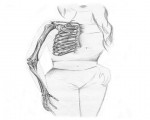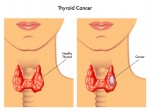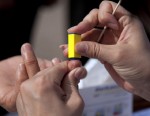Brain cancer what do you really know about it? Are you at risk? Are you concerned about developing it as a parent has recently been diagnosed? Does having chronic headaches mean you have brain cancer? Whats myth, and whats facts about this special form of cancer, and are their treatments available?
Each year in the United States alone, 190,000 are diagnosed and/or treated for brain tumors. When you develop a brain tumor (which many times does not turn into brain cancer and can be treated) it affects certain cells in your brain.
Often times, it does not leave the area of the brain, known as primary brain cancer. When it does move to another part of the body, this is known as metastatic brain cancer, and most commonly affect people over the age of 40, and young children under the age of 8.
So how do you know what signs your body is telling you is pointing to brain tumor or cancer? Pay attention to your body, and learn through early detection when its time to see a doctor, and when its a sign of something less serious. Here are some early and common signs of brain cancer to be aware of, and to begin your quest for information and insight into your own brain cancer education:
Seizures
Reoccurring headaches
Difficulty walking
Stumbling, and having difficulty doing normal and routine activities
Difficulty with memory, retaining information or staying alert
Slow but gradual problems with intellect, cognitive abilities or attention span.
The question for many people is when you should seek out the help and attention from a doctor, and when for example, a headache is just a headache. Pay attention to irregular and abnormal patterns. If youre clumsier than usual, eliminate other factors such as fatigue or a fluke that may be the cause. If youre having difficulty walking, see a doctor.
If youre having trouble with concentration, eliminate stressful causes that may be the reason youre experiencing this challenge. But if something just feels off, and youre bothered by your recent symptoms, dont hesitate or play the hero. See a physician right away.
Some other symptoms of brain cancer to be on the watch for, include:
Blurred or double vision
Coordination difficulty and/or trouble with balance
Significant changes in behavior (irritability, moody, etc.)
Problems with swallowing
Suddenly becoming drowsy in a rapid period of time, or becoming increasingly drowsy over a period of weeks or months
Falling, and easily bruising from falling, bumping or other injuries
Loss of appetite (especially important to pay attention to in children.)
Fever
Problems sleeping, such as insomnia and in particular, when child or adult has slept soundly in the past.
While there is still no cure for brain cancer, there is the opportunity to catch it early on in order to start treatment, and in order to prevent it from spreading. If youre concerned about your own health, focus on living the healthiest life possible today, such as eating a macrobiotic diet, limit your cell phone usage and avoid radiation exposure to the head whenever possible. When youre educated about brain cancer and can recognize the symptoms, you can lower your risk.
Recommended E-Book About Tumor
Living with a Brain Tumor: Dr. Peter Blacks Guide to Taking Control of Your Treatment













